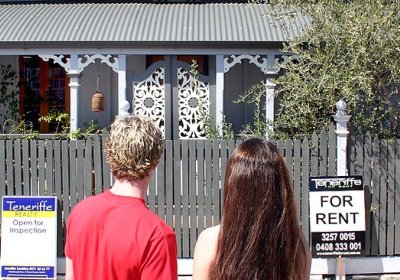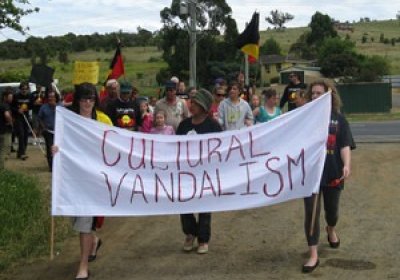A United Patriots Front (UPF) rally of about 20 people was met by 200 Say No to Racism protesters and about 25 police in Hobart on July 19.
The UPF rally moved from Franklin Square, through the Elizabeth Street Mall to the ABC building and concluded at the Domain Rose Gardens.
Say No to Racism protesters included Greens, Socialist Alliance, anarchists, local musicians, and people who had "never been to a rally before".
Say No to Racism protesters disrupted the UPF rally at each stopping point and as they marched on the street.
Linda Seaborn
Funding to provide legal services to the Tasmanian Aboriginal community has been denied to the 42-year-old Aboriginal Legal Service run by the Tasmanian Aboriginal Centre (TAC), and granted instead to the Victorian Aboriginal Legal Service.
The threat means the loss of $11.7 million over five years, and 15 jobs, many of them filled by Tasmanian Aboriginal people.
A bill targeting protests in Tasmania’s forests was passed in the Tasmanian lower house on June 26. It is due to be introduced to the upper house when parliament sits again this month.
The Tasmanian Aboriginal community and its supporters were outraged over the Aboriginal Heritage Protection Bill that was rushed through the lower house on November 13.
Brian Wightman, minister for environment, parks and heritage, tabled the bill, which will now proceed to the upper house. This bill is intended to replace the outdated and racist Aboriginal Relics Act.
Tasmanian Aboriginal activist Michael Mansell said he was grateful for the thoughts behind his Australia Day award nomination but that he “would be a hypocrite to accept it”.
Mansell has been outspoken about the offensiveness of Australia’s national day celebrating the invasion and dispossession of Australia’s Aboriginal people. He has participated in Invasion Day rallies held by the Tasmanian Aboriginal Centre for many years.
This is part two of an interview Green Left Weekly journalist Linda Seaborn conducted with Dr Bob Boughton who helped initiate a Cuban supported literacy program in the NSW town of Wilcannia.
This is an abridged transcript of an interview Linda Seaborn conducted with Dr Bob Boughton who helped initiate a Cuban supported literacy program in the NSW town of Wilcannia.linda
The Tasmanian Labor-Greens government and Housing Tasmania has faced criticism over its proposal to evict public housing tenants who earn above a certain income.
Originally, Consumer Affairs minister Nick McKim wanted the cap to be fixed at $66,000 a year. But a lobby campaign by the Tenants Union forced the government to remove the set limit and make it flexible instead.
The ABC said Housing Minister Cassy O'Connor said income limits would be decided by “regulation” and Housing Tasmania.
In an historic decision, Fair Work Australia (FWA) awarded pay rises of 19-41% to 150,000 mostly female workers in the social and community services sector (SACS) on February 1.
It was the most important equal pay case since equal pay for work of equal value was formally recognised in 1972.
The decision awards an extra 4% rise in loadings, designed to recognise impediments to bargaining in the industry. Workers will also be entitled to any wage review by FWA each year. The pay rises are effective from December 1, to be phased in over eight years.
Nala Mansell-McKenna is a well-known Aboriginal political activist in Tasmania, who was recently elected state secretary of the Tasmanian Aboriginal Centre (TAC).
“We like to call the secretary the role that’s our main political spokesperson, but when you work in the same building as Michael Mansell you are usually the second main political spokesperson,” she laughed, referring to the way that Michael (her father) is frequently contacted for comment on political issues.
When the Tasmanian state government forced a bridge through the kutalyana site as part of the Brighton bypass, the Aboriginal community responded by placing a ban on conducting Aboriginal heritage assessments.
These bans are being upheld by all Aboriginal Heritage Officers and the archeologists who work with them. They are intended to remain in place until the legislation that protects Aboriginal heritage is improved.
The first major project to be affected by this is the proposed asylum seeker detention centre at Pontville, near Brighton.
Opposition to the Brighton bypass bridge over the Jordan River in southern Tasmania escalated after the April 12 decision by the Tasmanian heritage minister Brian Wightman to give final approval for works to proceed.
The bridge will destroy kutalayna, a site of 42,000 years of Aboriginal occupation.
On April 14, protesters entered the site and stopped the works. On April 15, 21 people were arrested after protesters scaled the fence and entered the site in waves, stopping the work on several occasions.
- Page 1
- Next page









